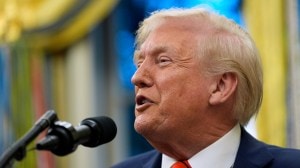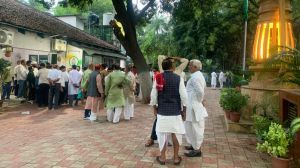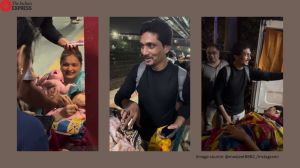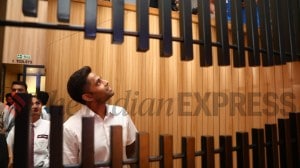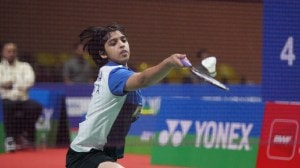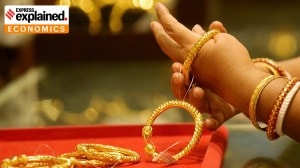In UK, Modi’s the one with the stiff upper lip
As Gujarat Chief Minister Narendra Modi’s caravan headed towards Wembley Conference Centre yesterday, hundreds of protesters from Londo...

As Gujarat Chief Minister Narendra Modi’s caravan headed towards Wembley Conference Centre yesterday, hundreds of protesters from London, Birmingham, Bradford and Bolton demanded a ‘‘Pinochet-style’’ arrest. They were shouting ‘‘Modi! Murderer.’’ When one of them tried to break the police cordon, he was promptly dragged back. The minor incident helped to raise the pitch of anti-Modi slogans and attract attention in what was otherwise a peaceful demonstration.
Inside, more than 2,500 of his supporters attentively listened to Modi’s vision of a ‘‘Vibrant Gujarat,’’ hosted by the Overseas Friends of the BJP.
The demonstration invited attention, the kind of attention Modi wouldn’t relish. The Guardian devoted a full page to Modi’s visit with a screaming headline: ‘‘He is blamed for the death of 2,000 Muslims in India. So why is this man in Wembley?’’
An accompanying profile reminded that Modi was likened by many of his enemies to Hitler, Milosevic and Pol Pot. In today’s press conference, that was the first question, how much is he bothered by this image of infamy? He said not at all.
He criticised the ‘‘five-star activists’’ who have made careers out of condemning him and who want to malign reputation of hardworking Gujaratis. He seems to be following on a well thought-out media strategy, not paying back to his critics in the same currency. Strategy partially worked. So how does he feel when compared to Hitler and Pol Pot. He said he has no knowledge of such criticism. He looked uncomfortable. He avoided argument as if belittling the critics. He was quiet and determined not to raise his volume. The politician within knows that he is faced with a bunch of sceptical reporters, so why raise the stakes.
Such uncomfortable distractions apart he was keen to talk about the ‘‘Vibrant Gujarat,’’—India’s most prosperous state, leader in petrochemicals, diamonds and pharmaceuticals. He had an impressive list of future projects—the fist Indian state to have a privatised railway, a cruise liner from Mumbai to Mandvi and fast infrastructural growth. Modi has in fact come here to extent invitations to a three-day Global Investors’ Summit from September 28-30.
But Modi’s enthusiastic vision is continuously haunted by the ghosts of communal carnage. The BBC’s Radio Five Live played vox pops from London’s main Gujarati shopping street, Ealing Road. ‘‘No we are not happy with his visit,’’ says one of the Gujarati shoppers. ‘‘The visit will create communal divide here too,’’ says another. Bilal Dawood is one of those leading campaign against the killings in Gujarat. His brother Fareed, 41, and his cousin, Shakeel, 38, were on holiday in the state when violence erupted and they were set ablaze with petrol by riotous mobs. He is trying to mobilise support for the prosecution of Modi. He hasn’t had much success so far. When some of the Muslim groups approached the British government to block Modi’s visit, the Home Office issued a statement: ‘‘We are aware he’s visiting the UK. He is not visiting at Her Majesty’s Government’s invitation nor does the government plan to have any contact with him when he’s here. We do understand the concerns expressed but there were no appropriate grounds to refuse Mr Modi a visa.’’






- 01
- 02
- 03
- 04
- 05








